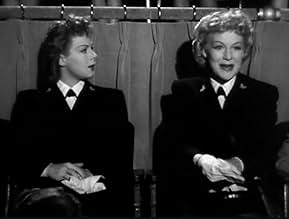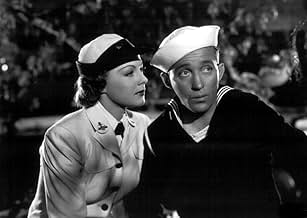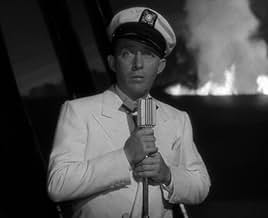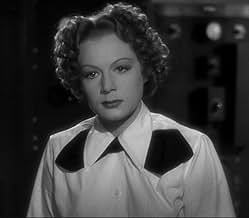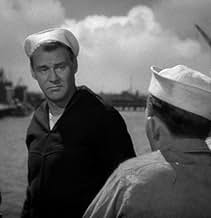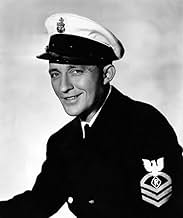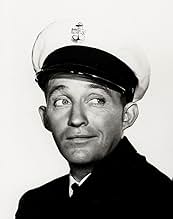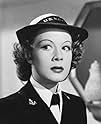AVALIAÇÃO DA IMDb
6,1/10
506
SUA AVALIAÇÃO
Adicionar um enredo no seu idiomaShow business twin sisters Rosemary and Susie, one serious and the other a scatterbrain, join the WAVES and both fall in love with crooner Johnny Cabot.Show business twin sisters Rosemary and Susie, one serious and the other a scatterbrain, join the WAVES and both fall in love with crooner Johnny Cabot.Show business twin sisters Rosemary and Susie, one serious and the other a scatterbrain, join the WAVES and both fall in love with crooner Johnny Cabot.
- Direção
- Roteiristas
- Artistas
- Indicado a 1 Oscar
- 1 indicação no total
Anabel Shaw
- Isabel
- (as Marjorie Henshaw)
Terry Adams
- Wave
- (não creditado)
Harry Barris
- Bandleader
- (não creditado)
Carmella Bergstrom
- Wave
- (não creditado)
Lillian Bronson
- Johnny Cabot Fan
- (não creditado)
Charles D. Brown
- Capt. Johnson
- (não creditado)
Mae Clarke
- Ens. Kirk
- (não creditado)
Carmen Clifford
- Bit Part
- (não creditado)
Yvonne De Carlo
- Wave
- (não creditado)
Evelyn Dockson
- Undetermined Role
- (não creditado)
Mimi Doyle
- Johnny Cabot Fan
- (não creditado)
- Direção
- Roteiristas
- Elenco e equipe completos
- Produção, bilheteria e muito mais no IMDbPro
Avaliações em destaque
Do you recall the brouhaha when Elvis was drafted? Well, that's nothing compared to what happens when the Navy lowers their physical requirements and the bobbysoxer's idol Johnny Cabot (Bing Crosby) enlists. Bing is quite funny spoofing that Hoboken lad as he ca-roons into the microphone for legions of swooning gals. His biggest fan is entertainer turned WAVE Susie Allison (Betty Hutton) who goes ga-ga in a big way. Susie's twin sister Rosemary (Betty Hutton) is the more sensible and reserved type so, naturally, Johnny falls for her. Sonny Tufts is appealing as a sailor pal with his own agenda. Lots of laughs and Harold Arlen/Johnny Mercer tunes make this wartime morale booster a pleasant way to spend an evening. Look for Ann Doran and Noel Neil in uniform.
Time capsule alert: The Arlen/Mercer standard "Acc-Cen-Tu-Ate the Positive" is introduced in this feature. Georgia boy Johnny Mercer wrote the tune to a specific cadence that fans of his recordings recognize and enjoy. I'm certain no offence was meant (even at such as late date as 1944) by introducing the song in blackface, but oh my, that sort of thing can be hard to take in 2007. On the plus side the performance of the song is straight-forward and attached to a delightful ensemble dance routine.
Time capsule alert: The Arlen/Mercer standard "Acc-Cen-Tu-Ate the Positive" is introduced in this feature. Georgia boy Johnny Mercer wrote the tune to a specific cadence that fans of his recordings recognize and enjoy. I'm certain no offence was meant (even at such as late date as 1944) by introducing the song in blackface, but oh my, that sort of thing can be hard to take in 2007. On the plus side the performance of the song is straight-forward and attached to a delightful ensemble dance routine.
Although this is a Bing Crosby film, the star of the film is Betty Hutton, as she's in the lion's share of the scenes--mostly because she plays twin sisters and she gets a lot of screen time. As one sister, Susan, she is very goofy and VERY unsubtle (much like her typical screen persona) and as the other, Rosemary, she is much more subtle and believable. Frankly, I felt her character of Susan was just TOO MUCH--and came off poorly. But, I was more impressed by her in the other role.
The film begins with Bing playing a man who is, pretty much, Bing Crosby--though he's named Johnny Cabot. Despite his age (41), he manages to enlist in the Navy--partly out of a desire to serve and partly to get away from his insane female fans. As for Susan and Rosemary, they are also performers and decide to enlist in the Waves (the female branch of the Navy). Susan is thrilled when she hears about Johnny being in the service, she endeavors to do ANYTHING to meet him and become his girlfriend. However, Johnny is NOT insane, so he naturally is not interested in the ditsy and obnoxious Susan but her sister. But, Johnny's 'pal' (Sonny Tufts) is determined to get Rosemary for himself--even if it mean double-crossing Johnny and helping Susan in her insane quest to trap Johnny for herself. The plan is so insane, that Susan poses as her sister and behaves abominably in order to drive a wedge between him and Rosemary! Like most Bing Crosby films, he naturally sings a few numbers--and his character is assigned to sing and dance to recruit ladies to the service. Hutton also sings a few numbers well but I was surprised to hear Tufts singing--particularly because of his very soft and high voice for a guy his size. It wasn't bad--just unexpected. Overall, the film has some cute moments and decent songs and is worth seeing. However, be forewarned--like in Crosby's "Holiday Inn" (1942), he does a horribly offensive black-face number--something that played okay back in the day but which will shock nearly everyone today!
The film begins with Bing playing a man who is, pretty much, Bing Crosby--though he's named Johnny Cabot. Despite his age (41), he manages to enlist in the Navy--partly out of a desire to serve and partly to get away from his insane female fans. As for Susan and Rosemary, they are also performers and decide to enlist in the Waves (the female branch of the Navy). Susan is thrilled when she hears about Johnny being in the service, she endeavors to do ANYTHING to meet him and become his girlfriend. However, Johnny is NOT insane, so he naturally is not interested in the ditsy and obnoxious Susan but her sister. But, Johnny's 'pal' (Sonny Tufts) is determined to get Rosemary for himself--even if it mean double-crossing Johnny and helping Susan in her insane quest to trap Johnny for herself. The plan is so insane, that Susan poses as her sister and behaves abominably in order to drive a wedge between him and Rosemary! Like most Bing Crosby films, he naturally sings a few numbers--and his character is assigned to sing and dance to recruit ladies to the service. Hutton also sings a few numbers well but I was surprised to hear Tufts singing--particularly because of his very soft and high voice for a guy his size. It wasn't bad--just unexpected. Overall, the film has some cute moments and decent songs and is worth seeing. However, be forewarned--like in Crosby's "Holiday Inn" (1942), he does a horribly offensive black-face number--something that played okay back in the day but which will shock nearly everyone today!
This is a movie that turned out to be much better than I thought it would. I had been led to believe that it was a light, patriotic movie. Certainly it was patriotic. However the story line was really quite good. Betty Hutton was challenged to play twins and to play two different personalities (one bubbly and scatterbrained, the other far more serious). She pulled it off very well indeed. The movie keeps getting better as Susan (the bubbly one) plots to get Johnny (Bing) for herself while Johnny really wants Rosemary (the serious one). As the plots and the misunderstandings grow there is also a show to put on that is touring the country to get women to enlist in the WAVES. There is good music and there are numerous scenes of light humor. This one qualifies in my book as good fun.
My late aunt, Kathleen C. Quinn, was the technical advisor for "Here Come the Waves". She was a Lieutenant(jg) in the WAVES and was assigned to the movie. She said that the most difficult part of her job was in getting both the studio and the female cast, including Betty Hutton, to keep the hair styles within WAVE regulation length. (Regulation length was much shorter than the popular styles of the time.) She always told us that both Bing and Betty were very easy to work with.
A previous reviewer remarked that part of the plot involved Bing Crosby memorizing color tests to mask his color blindness to get in the Navy. In point of fact Bing was actually color blind. During the 1930s and 1940s it was not uncommon to see him photographed in a lot of loud and mismatched apparel which was a source of fodder for Bob Hope's monologues. The reason was he couldn't pick out matching stuff for his wardrobe.
Harold Arlen and Johnny Mercer wrote a great score for Bing and Betty Hutton to vocalize. Hutton manages to take her manic energy down a notch in the duet I'll Promise You with Bing. But Betty goes full blast on There's A Fella Waiting in Poughkeepsie. Bing has a nice solo ballad in Let's Take The Long Way Home.
The hit song of the movie was one of Bing's biggest Ac-cent-chu-ate the Positive. Johnny Mercer wrote that Bing was an instant study, he could hear a tune once and get it. He knew without being told where to come in on the downbeat. But you had to record him that first time if you wanted your version of the song. After that he started with the ad-libs his recordings are famous for.
The plot is easy to take and it allowed Crosby to satirize his up and coming rival Frank Sinatra. Too bad he never commercially recorded That Old Black Magic which was reprised for this film.
Harold Arlen and Johnny Mercer wrote a great score for Bing and Betty Hutton to vocalize. Hutton manages to take her manic energy down a notch in the duet I'll Promise You with Bing. But Betty goes full blast on There's A Fella Waiting in Poughkeepsie. Bing has a nice solo ballad in Let's Take The Long Way Home.
The hit song of the movie was one of Bing's biggest Ac-cent-chu-ate the Positive. Johnny Mercer wrote that Bing was an instant study, he could hear a tune once and get it. He knew without being told where to come in on the downbeat. But you had to record him that first time if you wanted your version of the song. After that he started with the ad-libs his recordings are famous for.
The plot is easy to take and it allowed Crosby to satirize his up and coming rival Frank Sinatra. Too bad he never commercially recorded That Old Black Magic which was reprised for this film.
Você sabia?
- CuriosidadesOne of over 700 Paramount Productions, filmed between 1929 and 1949, which were sold to MCA/Universal in 1958 for television distribution, and have been owned and controlled by Universal ever since; its earliest documented telecast took place in Seattle Thursday 23 October 1958 on KIRO (Channel 7); it first aired in Phoenix Wednesday 19 August 1959 on KVAR (Channel 12); it was released on DVD 14 November 2006 as one of 5 titles in Universal's Bing Crosby Screen Legend Collection, and again 11 November 2014 as one of 24 titles in Universal's Bing Crosby Silver Screen Collection.
- Erros de gravaçãoWhen Betty Hutton begins to write a letter, she is shown in medium shot and she is obviously just scribbling on the paper, but after the cut to an over-the-shoulder shot, the writing does not match and it is neat and legible.
- ConexõesFeatured in How Hollywood Twins Scenes Have Evolved Over 100 Years (2021)
Principais escolhas
Faça login para avaliar e ver a lista de recomendações personalizadas
Detalhes
- Data de lançamento
- País de origem
- Idioma
- Também conhecido como
- Here Come the Waves
- Locações de filme
- Empresa de produção
- Consulte mais créditos da empresa na IMDbPro
- Tempo de duração
- 1 h 39 min(99 min)
- Cor
- Proporção
- 1.37 : 1
Contribua para esta página
Sugerir uma alteração ou adicionar conteúdo ausente

